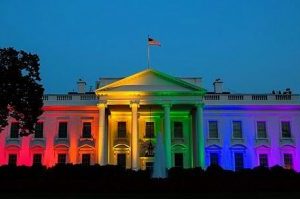If enacted into law, the Equality Act would further erode religious liberty, transform public opinion on sexuality, and harm the public perception of those who believe in traditional or biblical sexual morality. The bill would create federal anti-discrimination protections on the basis of sexual orientation and gender identity in public accommodations, education, employment, and housing. To do so, it would amend the 1964 Civil Rights Act to add “sexual orientation” and “gender identity” as protected classes . In short, the Equality Act would offer the same types of protections extended to other groups (on the basis of race, color, religion, and national origin) protected under the Civil Rights Act of 1964. The Equality Act represents the most invasive threat to religious liberty ever proposed. Were it to pass, its sweeping effects on religious liberty, free speech, and freedom of conscience would be historic.
The Equality Act promotes inequality because it would penalize Americans for their beliefs about marriage and biological sex.The Equality Act would amend federal civil rights law by adding “sexual orie ntation” and “gender identity” as protected classes. In recent years, Heritage Foundation scholars have sounded the alarm about various groups that would be harmed should the act become law, including employers and employees, medical professionals, parents and children, women, and nonprofits and volunteers.
Equally disturbing is the Equality Act’s lack of any conscience protections for individuals with moral or religious objections. Federal law has, for more than 40 years, provided for various conscience-protection provisions for individuals and entities in the context of health care. Those laws protect, for example, a nurse from having to participate in an abortion procedure or certain health plans from covering elective abortions. Such protections ensure that individuals and entities are not compelled to participate in practices that violate their sincere moral, ethical, or religious convictions.
The bill’s stated intentions and its actual consequences are very different. While the bill purports to protect individuals from discrimination, the Equality Act would discriminate against those who do not agree with a regime of laws premised on sexually permissive understandings of human nature that deny sexual complementarity. It would thus create a new form of discrimination by socially isolating certain beliefs.
Take Peter Vlaming. This high school French teacher was dismissed under the school’s anti-discrimination policy after he refused to comply with administrators’ orders to use a female student’s preferred masculine pronouns. Vlaming had tried to accommodate the student by avoiding pronouns altogether and addressing the student by their preferred masculine name, but this was deemed insufficient by the school board.
This politicization of medicine would ultimately harm families by
normalizing hormonal and surgical interventions for gender dysphoric
children as well as ideological “education” in schools and other public
venues. Yet activists continue to push their own radical protocol: social
transition as young as 4, puberty blocking drugs as young as 9,
cross-sex hormones as young as 14, and surgery by 18 (or, in some cases,
even younger). This protocol could become mandatory in the future. The latest issue
of the American Journal of Bioethics includes an article arguing that
the state should overrule the parents of gender dysphoric children who do not consent to giving them puberty-blocking drugs. In fact, parents in Ohio lost custody of their seventeen-year-old daughter because they declined to put her on testosterone supplements.
The Equality Act would force hospitals and insurers to provide and
pay for these therapies against any moral or medical objections. It
would politicize medicine by forcing professionals to act against their
best medical judgment and provide transition-affirming therapies. The fight is already here. Catholic hospitals in California and New Jersey
have been sued for declining to perform hysterectomies on otherwise
healthy women who want to become male. A third Catholic hospital in Washington
settled out of court when the ACLU sued them for declining to perform a
double mastectomy on a gender dysphoric sixteen-year-old girl.
Sexual orientation and gender identity laws that open up sex-specific facilities like bathrooms, locker rooms, etc. to members of the opposite sex enable sexual assault. For example, Pascha Thomas was forced to remove her child from school after a male classmate assaulted her five-year-old daughter in the girls’ restroom. The boy had access to the girls’ restroom because the school’s policy that grants students access to private facilities on the basis of self-identified gender identity. Administrators refused to change the policy despite Thomas’ complaints. The concern with these policies is that predators will take advantage of the law to gain access to victims. In the United Kingdom, where a similar law is already in place, a male rapist was transferred to a women’s prison because he “identifies” as a woman. Once there, he twice committed sexual assaults.
Individuals who support LGBT rights but also recognize that no citizen or institution should be penalized for sincerely held traditional beliefs about marriage, sexuality, and gender should oppose this legislation. Christians who desire the law to resemble the truth about marriage, sexuality, and gender should likewise be opposed. Expansive protections for some that lead to restricted liberties for others do not advance equality or tolerance. Instead, they cause coercion and subjugation.
To safeguard against threats to religious liberty, Senate and House leadership should quash the bill. Granting special rights to others while denying the religious liberty and conscience rights of others is unacceptable. Furthermore, citizens should voice their concerns to their elected officials.



"Christians who desire the law to resemble the truth about marriage, sexuality, and gender should likewise be opposed." "Truth" about marriage? Who's truth? Do we believe in freedom of religion or don't we? If you think this law is wrong, you clearly don't believe in freedom of religion. You only believe in the freedom to practice your own religion. Which is fine but, for crying out loud, be honest about it! Stop pretending like you think we should all have the same rights! You clearly don't or you wouldn't be opposed to any law that ensures that we do.
ReplyDelete